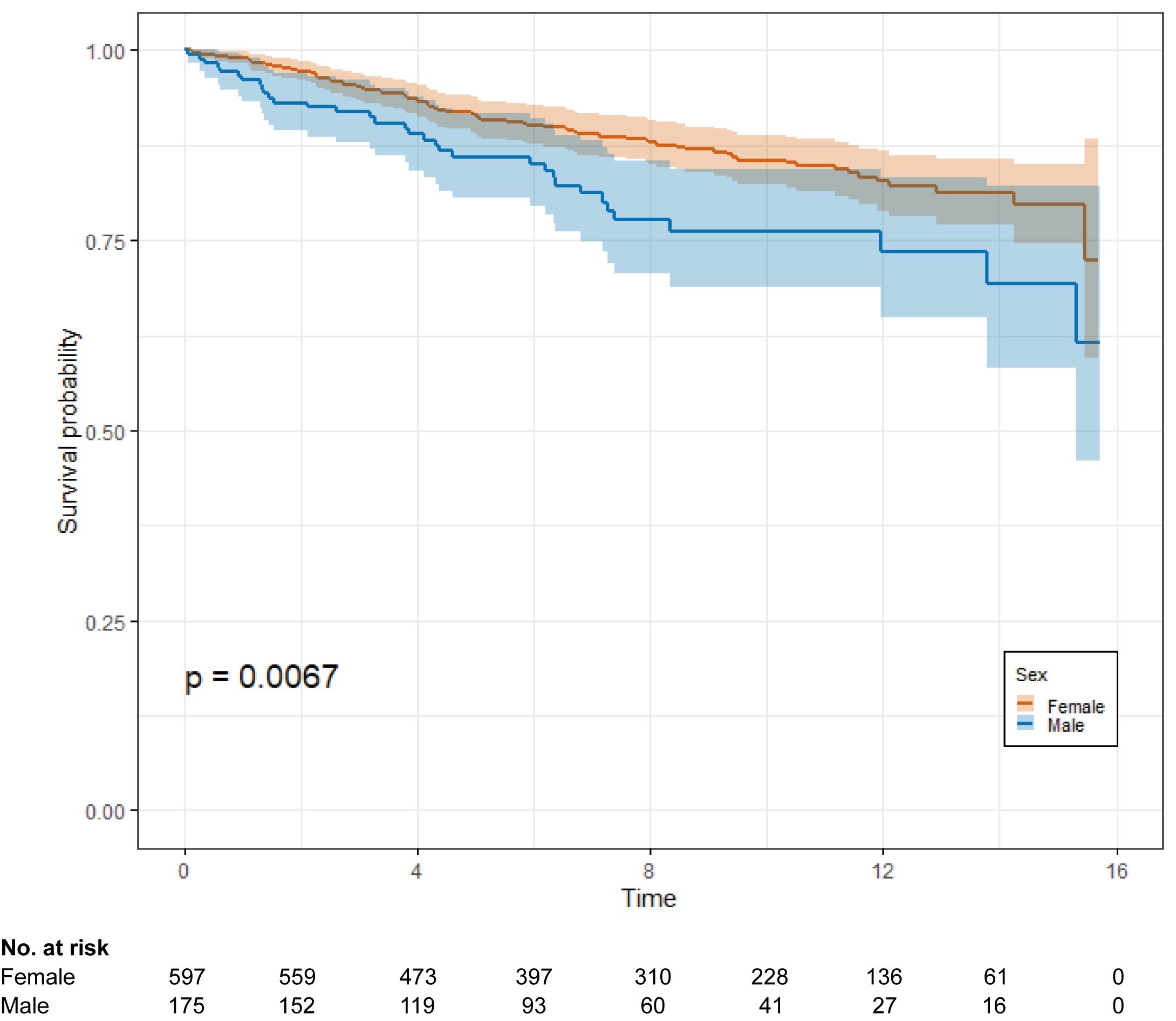Session Information
Date: Monday, October 27, 2025
Title: (1553–1591) Systemic Sclerosis & Related Disorders – Clinical Poster II
Session Type: Poster Session B
Session Time: 10:30AM-12:30PM
Background/Purpose: Patients with systemic sclerosis (SSc) face an uncertain long‑term outlook; understanding how their health‑related quality of life (HRQoL) changes over time can help them anticipate and plan for future challenges. For clinicians treating these patients, identifying which domains of HRQoL are most severely impacted and how they evolve over time can help facilitate more targeted and timely interventions aimed at improving patient outcomes. Given that males and females exhibit differences in disease activity and mortality related to SSc, this study aims to explore long-term HRQoL patterns stratified by sex, using the 36 Item Short Form Survey (SF-36).
Methods: Longitudinal data from 786 patients in the Leiden SSc cohort were analyzed using linear mixed models (LMMs) to assess changes in physical (PCS) and mental (MCS) component scores over time, with higher scores indicating better health, accounting for repeated measures. Cubic splines with knots at 2, 5, 7, and 10 years were included, with age, sex, and smoking status at baseline as fixed effects. A joint LMM explored trajectories across all SF-36 domains and their correlated random effects. Additionally, a Kaplan-Meier curve and a Cox model with a landmarking approach were used to assess sex-specific survival and the impact of PCS and MCS on all-cause mortality.
Results: Data from 3609 visits was used, with visits ranging from baseline to 15 years of follow-up, and a median follow-up time of 3 years. Mean age at baseline was 56 years, 77% (n=611) was female, and median disease duration (time since first non-Raynaud’s manifestation) at baseline was 2 years. At 15 years of follow-up, the estimated probability of death was 38.5% for males and 27.6% for females. Both the PCS and MCS remained essentially stable over 15 years for both males and females (Fig 1). Ever‑smokers had a lower PCS (-2.26, SE 0.72, p = 0.007). Older age predicted a faster PCS decline (p < 0.014).Males had a significantly higher MCS (2.53, SE 1.04, p=0.015), and MCS rose slightly with age (0.11, SE 0.03, p < 0.001). Older patients had a greater decline during the later stage of follow-up (between 7 and 10 years) (-0.22, SE 0.10, p=0.026). No significant sex differences in the MCS trajectory over time were observed.All eight domains showed stable scores (Fig 2A) and were strongly intercorrelated (Fig 2B).In the survival analysis, older age (HR 1.07, SE 0.01, p < 0.001) and male sex (HR 2.12, SE 0.14, p=0.022) increased death risk (Fig 3). Lastly, lower PCS were associated with higher mortality, with each 1-point lower PCS being linked to a 5% higher hazard of death (HR 0.95, SE 0.01, p < 0.001).
Conclusion: This 15‑year analysis—the longest SSc HRQoL follow‑up to date—shows a stable course of HRQoL in SSc over time as measured by the SF-36. Both the physical and mental component scores, and the different domains remain stable over time, with the domains showing high interconnectedness. Despite higher mortality, mental scores are better in male patients. Because worse self-reported physical health, older age, and male sex predict death, patients with low physical HRQoL scores warrant especially close monitoring and timely intervention.
 Fig 1. (A) Marginal PCS scores and (B) Marginal MCS scores over time for an average SSc patient stratified by sex. MCS: mental component score; PCS: physical component score; SSc: systemic sclerosis.
Fig 1. (A) Marginal PCS scores and (B) Marginal MCS scores over time for an average SSc patient stratified by sex. MCS: mental component score; PCS: physical component score; SSc: systemic sclerosis.
.jpg) Fig 2. (A) Marginal score of all eight domains over time for an average SSc patient. (B) Correlation table for each domain of the SF-36. BP: bodily pain; GH: general health; MH: mental health; PF: physical functioning; RE: role limitations due to emotional problems; RP: role limitations due to physical health; SF: social functioning; VT: vitality SSc: systemic sclerosis.
Fig 2. (A) Marginal score of all eight domains over time for an average SSc patient. (B) Correlation table for each domain of the SF-36. BP: bodily pain; GH: general health; MH: mental health; PF: physical functioning; RE: role limitations due to emotional problems; RP: role limitations due to physical health; SF: social functioning; VT: vitality SSc: systemic sclerosis.
.jpg) Fig 3. Kaplan Meier plot for all-cause mortality with 95% confidence interval, stratified by sex.
Fig 3. Kaplan Meier plot for all-cause mortality with 95% confidence interval, stratified by sex.
To cite this abstract in AMA style:
van der Wouden K, Gomon G, Knevel R, Tsang-A-Sjoe M, Voskuijl A, de Vries-Bouwstra J. Health-related quality of life over 15 years in systemic sclerosis: impact of sex and survival [abstract]. Arthritis Rheumatol. 2025; 77 (suppl 9). https://acrabstracts.org/abstract/health-related-quality-of-life-over-15-years-in-systemic-sclerosis-impact-of-sex-and-survival/. Accessed .« Back to ACR Convergence 2025
ACR Meeting Abstracts - https://acrabstracts.org/abstract/health-related-quality-of-life-over-15-years-in-systemic-sclerosis-impact-of-sex-and-survival/
